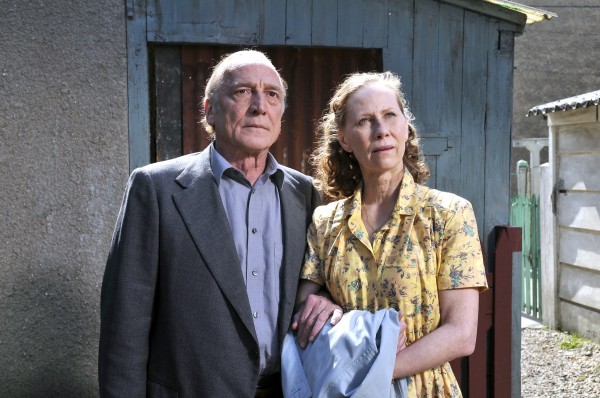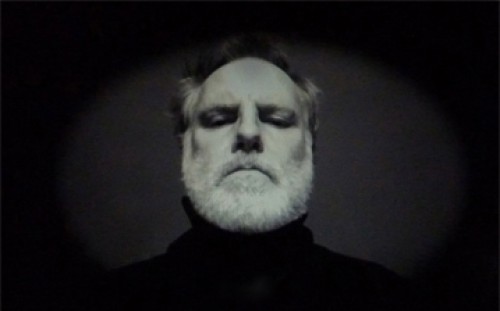
Eclectic Canadian filmmaker Guy Maddin will be taking part in a pair of special Performa 11 presentations on Friday and Saturday
Tales from the Gimli Hospital: Reframed
November 18-19, Walter Reade Theater, 165 West 65th St., $25-$30, 7:00 & 9:00
www.11.performa-arts.org/event
“The Power of a Continuity-Free Cinema”
Saturday, November 19, Performa Hub, 233 Mott St., $10, 3:00
www.11.performa-arts.org/event
During a career that has now reached a quarter of a century, iconoclastic Canadian filmmaker Guy Maddin has made ten feature films and more than two dozen shorts, many of them harkening back to the early days of silent black-and-white cinema. His eclectic tales often blend fact with fiction, the past with the present (and the future), as evidenced in such critical successes as Careful (1992), The Heart of the World (2000), and My Winnipeg (2007). He has also expanded the notion of cinema with such works as Cowards Bend the Knee (2003), which was initially shown in ten segments screening at individual stations, and Brand upon the Brain! A Remembrance in 12 Chapters (2006), which debuted with live music and narration. For Performa 11, Maddin is going back to his first feature film, 1988’s Tales from the Gimli Hospital, adding a new score by Matthew Patton that will be performed live by an Icelandic supergroup, electronics engineer Paul Corley, and Seattle-based collective Aono Jikken Ensemble, along with new narration sung and spoken by Kristín Anna Valtýsdóttir. The exciting program takes place at the Walter Reade Theater on November 18-19, directed by Maddin, who will also be teaching the film class “The Power of a Continuity-Free Cinema” on Saturday afternoon. We corresponded with Maddin via e-mail as he prepared to participate in Performa 11.
twi-ny: What made you want to revisit your first film, Tales from the Gimli Hospital, for Performa 11?
Guy Maddin I thought, of all the films of mine that might actually thematically justify a revisiting from the director (something that truly ought not to be done under almost any circumstances!), then this was the title. The movie, if it’s about anything, seems to play with the Icelandic proclivity for making personal lives into timeless myths. I chose to use the project to help us timid Canadians take up the task of doing the same thing for our smaller-than-life selves. There’s a serious national myth debt in Canada. Back in 1988, when I completed the movie, I tried to right that wrong by myself, using the great vocabularies of early Hollywood dream factories and the sassitudes of the ancient Icelandic sagas. We have a wondrous and perverted history up here in Canada, but our temperament is too weak, our storytelling flare too pallid, to impart to these stories the bigger-than-life lineaments required to elevate a person or incident to mythic dimensions. Americans can do this stuff in their sleep, so you might be puzzled to hear of a country struggling with such things.
Anyway, myths are the product of a long process of telling and retelling, word-of-mouth burnishings into canonical permanence that can take decades, centuries, or even millennia to complete. I wanted to do it overnight, using artificial means aided by methods borrowed from Hollywood, and now, twenty-three years later, I get to artificially update this saga of Icelanders struggling as delirious pioneers in the Canadian north by speed-composting twenty-three years’ worth of word-of-mouth retellings all in one night at Lincoln Center. I feel a bit like a mad scientist, but with my Petri dishes brimming with narrative gelatins instead of the usual sneeze-cultures. It’s crazy. If I’d tackled any other movie of mine, I’d simply be trying to reduce the humiliations produced by a dated filmography, but here I can use this mad process of allowing the stories to evolve in ways beyond my control to actually increase my humiliation!
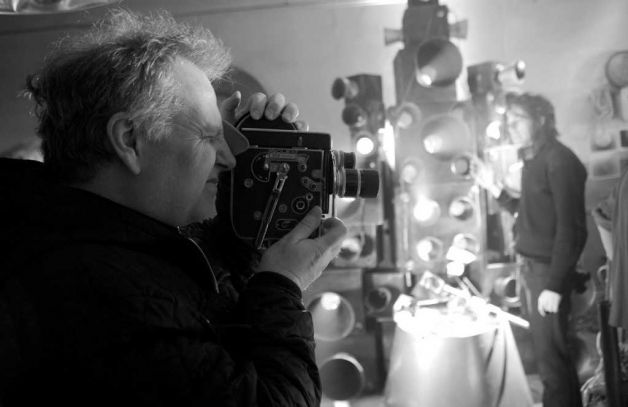
Guy Maddin will be reframing his feature-length debut at Lincoln Center as part of Performa 11 (photo courtesy Guy Maddin)
twi-ny: How did you go about selecting the diverse range of musicians for this event?
Guy Maddin: Some of these were people located by Matthew Patton, the composer originally commissioned to create the new score. He’s a fervid Icelandophile and collected the phone numbers of some of the most talented musicians in that country. Incredible, unearthly, and eerie music is their coin of the realm. One gets the feeling their music would play the same backward as forward, that they waft out melodic palindromes on warm breezes of helium, that the actual source of these strains is the elf king’s adamantine face fixed and hidden somewhere in the Icelandic lava canyons. The other musicians are my friends from the Seattle-based Aono Jikken Ensemble, who performed for my Brand upon the Brain show that I mounted here in New York a few years ago. I love these equally mysterious alchemists. I have no idea how they even make some of the sounds they send out into the theater, although the audience will be able to watch them and perhaps divine for themselves.
I love making the component parts of a film visible to the public. It’s boredom insurance. I’m not thrilled about the vivisection of animals, but of films — I’m all for it!
twi-ny: We have to say that we’re for it too. That’s part of the reason why we’ll be attending the class you’ll be leading on Saturday afternoon, “The Power of a Continuity-Free Cinema.” What can people expect from that class? And what exactly is “Continuity-Free Cinema”?
Guy Maddin: Good question. I’ll be bluffing my way through that class. I guess I plucked the title out of my past, the early days of my career when everyone on set was a continuity expert. It drove me nuts when everyone pointed out to me, or refused to perform because of, the continuity errors I was making. I grew to hate these literal-minded people and to love bad continuity. No one really utters this vilest of c-words anymore. Terrence Malick hasn’t had two consecutive shots cut to continuity in his entire career. It’s gone. Maybe I’ll just show Tree of Life on DVD and dismiss the class when the credits roll. Maybe I’ll show some early examples of flagrant discontinuity from film history and try to share with my students the gooseflesh these incidents produce.
twi-ny: Sounds like it should be fun. Much of your work is not only about cinema itself but the physical and psychological experience involved with watching and listening to a film. With more and more people watching movies on computers and tiny handheld devices, is cinema as we knew it, as Peter Greenaway has announced, dead?
Guy Maddin: Nah, there’s still no better first date than a movie in a theater with popcorn. And we’ll always need first dates, or something like them. On a second date couples can meet up in some motel and watch my stuff on some lurid handheld device. Until we eliminate the first date, cinema is alive.



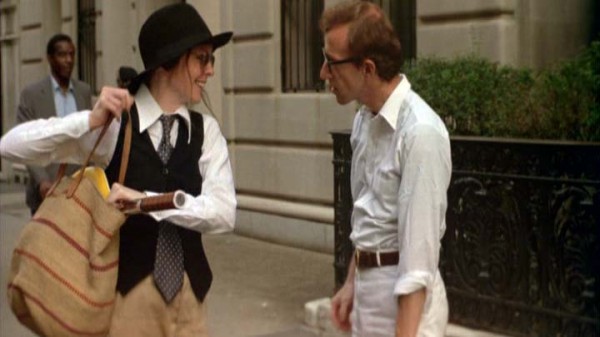
 One of the funniest, most-quoted romantic comedies in film history, Woody Allen’s Annie Hall is a pure delight from start to finish. It’s ostensibly a luuuuuurve story about a nebbishy Jew (Allen as Alvy Singer) and the ultimate WASPy goy (Diane Keaton as the title character), but it’s really about so much more: large vibrating eggs, right turns on red lights, television, Existential Motifs in Russian Literature, California, slippery crustaceans, driving through Plutonium, dead sharks, Freud, Hitler, Leopold and Loeb, religion, cocaine, Shakespeare in the Park, Buick-size spiders, planet Earth, and, well, la-di-da, la-di-da, la la. Nominated for five Oscars and taking home four — for Best Original Screenplay (Allen and Marshall Brickman), Best Director (Allen), Best Actress (Keaton), and Best Film — Annie Hall is screening November 6 and 8 at the Film Society of Lincoln Center’s “Hollywood’s ‘Jew Wave’” series, where such scenes as Annie’s grandmother seeing Alvy as an Orthodox rabbi at the dinner table should take on added significance. The eleven-day festival features eighteen (chai!) movies by and/or about Jews made between 1968 and 1977, a period that saw the influx of such actors as Elliott Gold, George Segal, Dustin Hoffman, Barbra Streisand, Richard Dreyfuss, Zero Mostel, and other members of the tribe. Allen fans should also be interested in checking out Martin Ritt’s The Front, in which Woody plays a bookie who becomes a front for blacklisted writers (one of whom, screenwriter Walter Bernstein, will be on hand for a Q&A on November 7), and The Touch, an English-language film made by one of the Woodman’s biggest influences, Ingmar Bergman.
One of the funniest, most-quoted romantic comedies in film history, Woody Allen’s Annie Hall is a pure delight from start to finish. It’s ostensibly a luuuuuurve story about a nebbishy Jew (Allen as Alvy Singer) and the ultimate WASPy goy (Diane Keaton as the title character), but it’s really about so much more: large vibrating eggs, right turns on red lights, television, Existential Motifs in Russian Literature, California, slippery crustaceans, driving through Plutonium, dead sharks, Freud, Hitler, Leopold and Loeb, religion, cocaine, Shakespeare in the Park, Buick-size spiders, planet Earth, and, well, la-di-da, la-di-da, la la. Nominated for five Oscars and taking home four — for Best Original Screenplay (Allen and Marshall Brickman), Best Director (Allen), Best Actress (Keaton), and Best Film — Annie Hall is screening November 6 and 8 at the Film Society of Lincoln Center’s “Hollywood’s ‘Jew Wave’” series, where such scenes as Annie’s grandmother seeing Alvy as an Orthodox rabbi at the dinner table should take on added significance. The eleven-day festival features eighteen (chai!) movies by and/or about Jews made between 1968 and 1977, a period that saw the influx of such actors as Elliott Gold, George Segal, Dustin Hoffman, Barbra Streisand, Richard Dreyfuss, Zero Mostel, and other members of the tribe. Allen fans should also be interested in checking out Martin Ritt’s The Front, in which Woody plays a bookie who becomes a front for blacklisted writers (one of whom, screenwriter Walter Bernstein, will be on hand for a Q&A on November 7), and The Touch, an English-language film made by one of the Woodman’s biggest influences, Ingmar Bergman.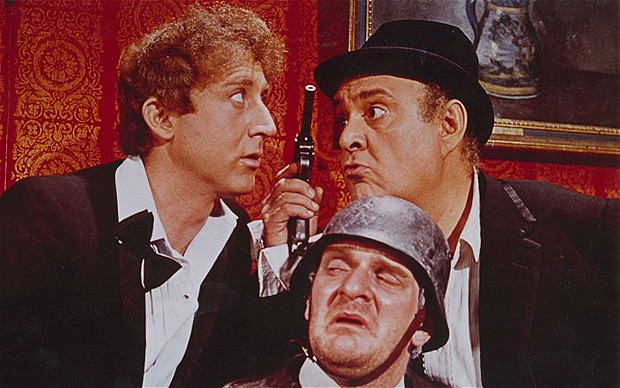

 When Leslie Braverman suddenly dies at the ripe old age of forty-one, four of his childhood friends reunite to attend the funeral in this very different kind of road movie. Morroe Rieff (George Segal), Barnet Weinstein (Jack Warden), Felix Ottensteen (Joseph Wiseman), and Holly Levine (Sorrell Booke) have one helluva time trying to get to temple on time as they battle traffic, a crazy cabbie (Godfrey Cambridge), and other urban impediments on their way from Sheridan Square to Brooklyn — even though they don’t know exactly which funeral house to go to. Jessica Walter as Inez Braverman, Phyllis Newman as Miss Mandelbaum, and Alan King as a wacky rabbi add to the fun. Based on Wallace Markfield’s 1964 novel, To an Early Grave, this charming little cult fave was written by longtime television variety show scribe Herb Sargent (Saturday Night Live, The Tonight Show Starring Johnny Carson), directed by Sidney Lumet (Serpico, Dog Day Afternoon), and shot by Boris Kaufman (one of Dziga Vertov’s brothers). This very funny absurdist comedy will sneak up on you when you least expect it. Bye Bye Braverman is screening November 3 at 6:30 (introduced by series coprogrammer J. Hoberman) and on November 12 at 3:45 as part of the Film Society of Lincoln Center’s “Hollywood’s ‘Jew Wave’” festival, eighteen (chai!) films made between 1968 and 1977 by and/or about Jewish characters, including such rarities as Ján Kadár’s The Angel Levine (with Zero Mostel as Morris Mishkin and Harry Belafonte as Alexander Levine) and Stuart Rosenbert’s Move (with Elliott Gould and Paula Prentiss), such lesser-known favorites as Karel Reisz’s The Gambler and Michael Roemer’s The Plot Against Harry, and such timeless gems as Woody Allen’s Annie Hall and Ted Kotcheff’s The Apprenticeship of Duddy Kravitz. Among those showing up to talk about the films are Gould (Robert Altman’s California Split), Walter Bernstein (Martin Ritt’s The Front), James Toback (The Gambler), Charles Grodin (Elaine May’s The Heartbreak Kid), Buck Henry (Herbert Ross’s The Owl and the Pussycat), and Gould again with the Safdie brothers (Ingmar Bergman’s The Touch.)
When Leslie Braverman suddenly dies at the ripe old age of forty-one, four of his childhood friends reunite to attend the funeral in this very different kind of road movie. Morroe Rieff (George Segal), Barnet Weinstein (Jack Warden), Felix Ottensteen (Joseph Wiseman), and Holly Levine (Sorrell Booke) have one helluva time trying to get to temple on time as they battle traffic, a crazy cabbie (Godfrey Cambridge), and other urban impediments on their way from Sheridan Square to Brooklyn — even though they don’t know exactly which funeral house to go to. Jessica Walter as Inez Braverman, Phyllis Newman as Miss Mandelbaum, and Alan King as a wacky rabbi add to the fun. Based on Wallace Markfield’s 1964 novel, To an Early Grave, this charming little cult fave was written by longtime television variety show scribe Herb Sargent (Saturday Night Live, The Tonight Show Starring Johnny Carson), directed by Sidney Lumet (Serpico, Dog Day Afternoon), and shot by Boris Kaufman (one of Dziga Vertov’s brothers). This very funny absurdist comedy will sneak up on you when you least expect it. Bye Bye Braverman is screening November 3 at 6:30 (introduced by series coprogrammer J. Hoberman) and on November 12 at 3:45 as part of the Film Society of Lincoln Center’s “Hollywood’s ‘Jew Wave’” festival, eighteen (chai!) films made between 1968 and 1977 by and/or about Jewish characters, including such rarities as Ján Kadár’s The Angel Levine (with Zero Mostel as Morris Mishkin and Harry Belafonte as Alexander Levine) and Stuart Rosenbert’s Move (with Elliott Gould and Paula Prentiss), such lesser-known favorites as Karel Reisz’s The Gambler and Michael Roemer’s The Plot Against Harry, and such timeless gems as Woody Allen’s Annie Hall and Ted Kotcheff’s The Apprenticeship of Duddy Kravitz. Among those showing up to talk about the films are Gould (Robert Altman’s California Split), Walter Bernstein (Martin Ritt’s The Front), James Toback (The Gambler), Charles Grodin (Elaine May’s The Heartbreak Kid), Buck Henry (Herbert Ross’s The Owl and the Pussycat), and Gould again with the Safdie brothers (Ingmar Bergman’s The Touch.)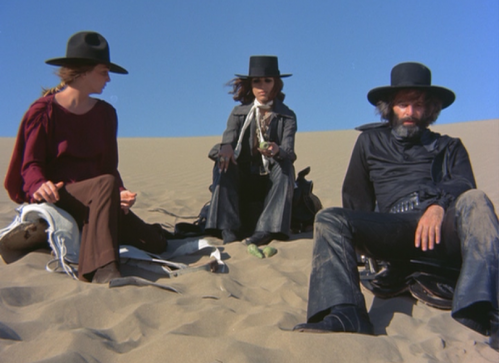
 Chilean-born Mexican filmmaker Alejandro Jodorowsky’s El Topo is a psychedelic head trip, an acid Western that will blow your mind. Jodorowsky stars as the title character, a gunslinger traveling through a deserted landscape accompanied by his naked young son, who already knows his way around a firearm. After coming upon a town that has been decimated by a nasty group of marauders working for the Colonel, El Topo seeks violent revenge, eventually taking off with a woman and leaving his boy behind as he meets four masters on his path to proving he is the best there is. But soon El Topo is praying for redemption with a community of inbred cripples trapped in a cave. El Topo is a wild and bizarre journey through religious imagery, romance, and vengeance, a surreal spaghetti Western strained through the mad mind of Jodorowsky, widely hailed as the creator of the midnight movie. The film melds Bergman with Leone, Tod Browning’s Freaks with Hiroshi Inagaki’s Samurai Trilogy, filtered through Kazuo Koike and Goseki Kojima’s Lone Wolf and Cub. It’s like nothing you’ve ever seen before and, despite your better instincts, will lure you into the cult of Jodorowsky. El Topo is screening on All Saints’ Day at Lincoln Center, introduced by Jodorowsky and followed by a conversation with outgoing Film Society program director Richard Peña; the night before, Jodorowsky will be at MoMA to introduce a screening of
Chilean-born Mexican filmmaker Alejandro Jodorowsky’s El Topo is a psychedelic head trip, an acid Western that will blow your mind. Jodorowsky stars as the title character, a gunslinger traveling through a deserted landscape accompanied by his naked young son, who already knows his way around a firearm. After coming upon a town that has been decimated by a nasty group of marauders working for the Colonel, El Topo seeks violent revenge, eventually taking off with a woman and leaving his boy behind as he meets four masters on his path to proving he is the best there is. But soon El Topo is praying for redemption with a community of inbred cripples trapped in a cave. El Topo is a wild and bizarre journey through religious imagery, romance, and vengeance, a surreal spaghetti Western strained through the mad mind of Jodorowsky, widely hailed as the creator of the midnight movie. The film melds Bergman with Leone, Tod Browning’s Freaks with Hiroshi Inagaki’s Samurai Trilogy, filtered through Kazuo Koike and Goseki Kojima’s Lone Wolf and Cub. It’s like nothing you’ve ever seen before and, despite your better instincts, will lure you into the cult of Jodorowsky. El Topo is screening on All Saints’ Day at Lincoln Center, introduced by Jodorowsky and followed by a conversation with outgoing Film Society program director Richard Peña; the night before, Jodorowsky will be at MoMA to introduce a screening of 